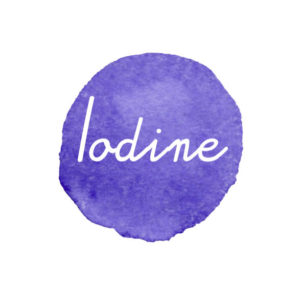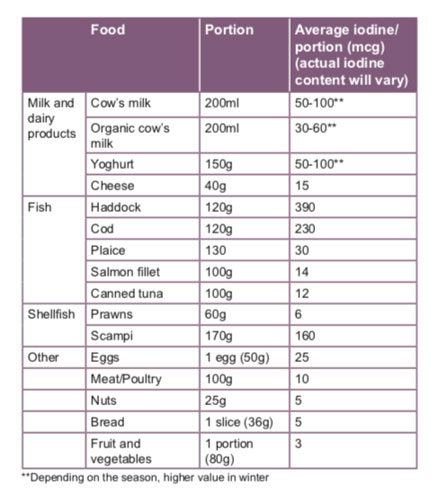What does it do and why do we need it?
Iodine is a mineral that you need to get from your diet. Iodine is used to produce thyroid hormones. (The thyroid is a gland in your neck responsible for growth, development and metabolism). In pregnancy, iodine is particularly important for the brain development of the foetus, as in earlier pregnancy, the foetus can’t yet make their own thyroid hormones, and so they rely on the mother’s supply. So it’s vital the mother has enough iodine for their own thyroid needs, and that of the developing foetus. Similarly, when breastfeeding, the mother is supplying the baby with its iodine needs through breastmilk, and the baby’s brain is still developing.

History of iodine in the UK:
Back in the 1920’s there was widespread iodine deficiency in the UK, this was still seen in the 1960’s. One easy to spot symptom of deficiency is goitre, a swelling of the thyroid gland in your neck. The iodine intake of the population was improved through schemes such feeding cattle iodine fortified feed and encouraging milk consumption, for example the Schools Milk Scheme. However now we have a different problem emerging. Some groups in the UK are at risk again of iodine deficiency. The national diet and nutrition survey has shown a decreasing trend in iodine intake especially in young women. This is especially concerning as there are increased requirements in pregnancy.
The increase in plant milks, veganism, vegetarianism will mean iodine is a nutrient to be aware of. It is great to see iodine fortified plant milks coming onto the market which will help.
How much do I need?
The World Health Organisation recommends the guideline for adults is 150 micrograms (µg) a day, and 250µg/d for pregnant women and breastfeeding women. Children age 0-5 should have 90µg/d and children 6-12 years should have 120µg/d.
The UK recommendations are a little lower in pregnancy, set at 200 µg/d

Where can I get it?
Foods rich in iodine include: seaweed, milk and dairy products, white fish and eggs.
Iodised salt is another source, but it isn’t readily available in the UK, and it’s not advisable to increase salt intake, for other health risks such as high blood pressure.
Supplements containing ‘potassium iodide’ or ‘potassium iodate’ up to 150µg/d are recommended if you’re vegetarian or vegan.

How can I get that much in my diet?
- A glass of milk contains a third of your daily requirements, as does an egg.
- A yoghurt has half your daily requirements
- A piece of cod or haddock at least once a week would be great for topping up stores as they are a very rich source of iodine.
If you’re planning to get pregnant, build up your stores now. Note, not all pregnancy supplements contain iodine so check the label.
What happens if I don’t get enough iodine in my diet?
Not getting enough iodine, is the most preventable cause of brain damage around the world. Your body will produce more of the thyroid hormone tri-iodothyroinine, aka T3, instead of thyroxine, aka T4, because it uses less iodine to make. Less T4 for a foetus effects their brain development and motor skill development, and again irreversible brain damage.
When more severe, iodine-deficiency results in cretinism where one can be deaf and mute, not be able to control the movements of arms and legs, not develop sexually, and not grow to full height and have severe learning difficulties.
The other result of iodine-deficiency is goitre, where the thyroid gland swells to try and ‘trap’ more iodine, and this results in visible swelling in the neck. When deficiency is more mild, it effects reading ability, spelling scores and IQ.
On a more general note, low levels of thyroid hormones can cause symptoms such as tiredness, dry skin, muscle aches and loss of libido.
People most at risk of iodine deficiency are schoolage children, teenage girls, pregnant and breastfeeding women. Also, people who live in areas where the soil is deficient in iodine, therefore the food grown in those soils aren’t iodine rich. This tends to occur in mountainous areas, or areas prone to flooding, therefore we in the UK may be effected by imported foods. In addition, people who avoid fish and or dairy are at risk of iodine deficiency.
How much is too much?
Unusually, too much iodine, and too little iodine, can have the same symptoms: you can develop hyperthyroidism or hypothyroidism. Also certain people are susceptible to these issues even with normal iodine intakes. Don’t exceed 600µg/d, or suddenly switch to having a lot. It’s best not to regularly eat brown seaweed as it’s such a rich source of iodine, particularly in pregnancy when risk of excess is more dangerous.
https://www.ukiodine.org/iodine-in-the-uk/ https://www.bda.uk.com/foodfacts/Iodine.pdf
Thanks to Naomi Leppitt for her help with this post.